Fun fact, the Mandelbrot set is a 2-dimensional set (because it’s defined in the complex plane). However, its boundary line is a fractal, which can be understood as having a non-integer dimension (i.e., between 1, the topological dimension of a line, and 2, the dimension of a plane). There are multiple ways to define fractal dimensions such as the Hausdorff dimension. For example, the Sierpinski triangle has a Hausdorff dimension of 1.58. But the Mandelbrot set is special here, too, as it seems to have a Hausdorff dimension of 2, meaning that its boundary is so curly that it fills “a plane’s worth of space” despite its line-like topology.
I forget where I heard this but someone mentioned that a 4-dimensional being could mirror you. Doesn’t sound so bad until you realize your amino acids & stuff would all be the opposite chirality, which means you could no longer process food.
This, the mirroring part, also happens in an Arthur C. Clarke short story: https://en.wikipedia.org/wiki/Technical_Error
Mass Effect has a similar idea. There are species that eat levo foods and ones that eat dextro foods.
There’s a great YA book about this: https://en.wikipedia.org/wiki/The_Boy_Who_Reversed_Himself?wprov=sfla1
I should’ve known that word

…isn’t the 4th dimension just time?
Time is a 4th dimension when talking about spacetime, which assumes three dimensions of space and one dimension of progressing time.
In geometry, a 4-dimensional object can be projected as a 3-dimensional shadow.
Time is a 4th dimension when talking about spacetime, which assumes three dimensions of space and one dimension of progressing time.
Yeah, that’s basically what I was referring to. Everything I know about dimensions, I learned from Doctor Who, Hitchhiker’s Guide to the Galaxy and Donnie Darko!
stabs pencil through folded paper to illustrate wormhole
FWIW our current understanding of spacetime includes multi-dimensional time, which is why we experience more or less time when we are traveling at high speed or experiencing strong gravitational fields. It’s sort of like moving diagonally across a room, except entirely different.
That is not how time dilation works.
I know, that’s why I said it’s entirely different.
But also, we don’t know exactly how time dilation works. We know it does, because it makes sense mathematically and we have experienced it in applications, but we don’t really know how it works.






